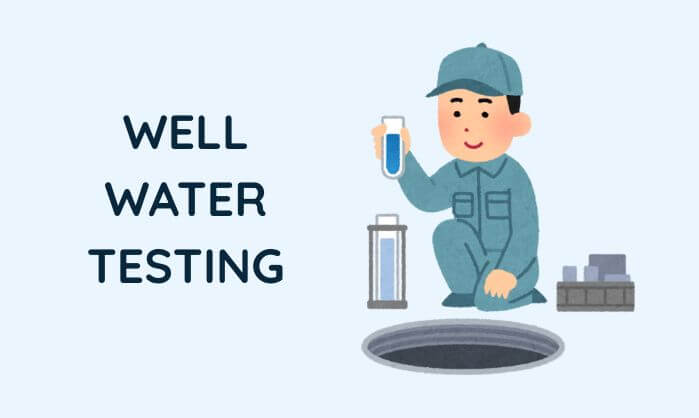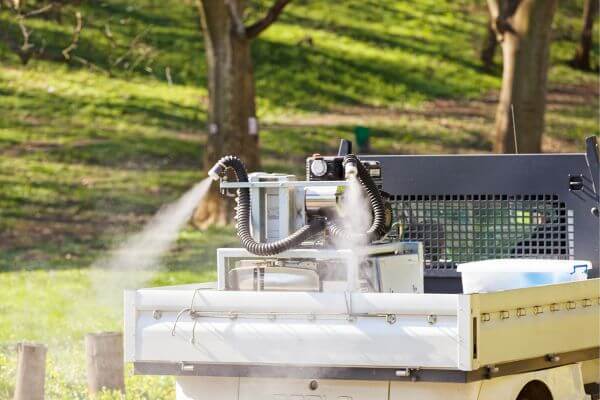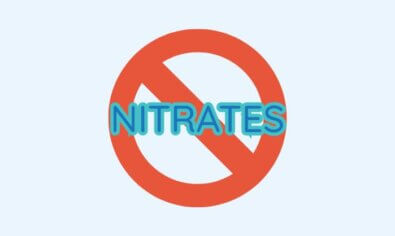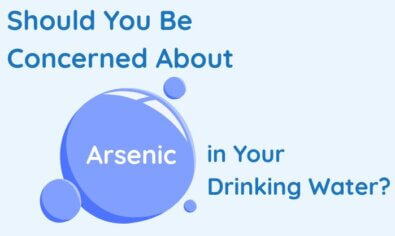Well Water Testing: What Should You Be Testing For
If you rely on a private well for your home’s water, regular well water testing is critical.
City water is checked by the government, but private wells are not. This means you are the one who needs to make sure your water is safe for your family.
Well water testing looks for germs, chemicals, and other things that can make water unsafe:
- The process includes collecting a water sample, sending it to a lab, and reviewing the results.
- Common tests look for coliform bacteria in well water, nitrates, pH levels, and other contaminants.
- Homeowners should test their wells every year, after flooding, or if the water suddenly smells, tastes, or looks different.
- Angel Water provides expert testing and treatment in Northern Illinois and Southeast Florida to keep your water safe.
Let’s dive in!

Why Well Water Testing Matters
Your drinking water might look clean and taste fine, but that doesn’t mean it’s safe.
Farms, weather, or even your septic system can change what’s in your water. Some dangerous things in water can’t be seen, smelled, or tasted. Without regular testing, you might not know they are there.
Drinking water with these hidden contaminants can make people sick, especially young children, pregnant women, or anyone with a weak immune system.
Some of the most common issues found in well water include:
- Coliform bacteria (including E. coli)
- Nitrates from fertilizer runoff
- Heavy metals like lead or arsenic
- Pesticides and herbicides
- Hard water minerals, such as calcium and magnesium
Testing your well water every year helps you catch problems early. This keeps your family healthy and protects your plumbing from damage. Regular well water testing gives you peace of mind that your water is safe to drink and use every day.
The Well Water Testing Process: From Start to Finish
The steps for testing your well water can be a little different depending on the company and what you need to test.
Here’s a simple outline of how the process usually works:
- Gathering information:
First, you’ll talk with the water testing company about your well. They may ask if you’ve noticed any changes in your water’s taste or smell. They’ll also want to know how old your well is, where it’s located, and if you’ve tested it before.
- Picking the right tests:
Next, you and the company will decide which tests are best for your well. Most people start with a basic test for common problems. If your well is near a farm or an old factory, or if you have other concerns, you might need extra tests.
- Collecting the water sample:
Now it’s time to collect a sample of your water. You can do this from your kitchen tap or right from the well.
It’s important to follow the directions carefully so the sample doesn’t get mixed up with anything else. Many people choose to have a professional, like a licensed plumber, collect the sample to make sure it’s done right.
- Lab analysis:
The water sample goes to a special lab that is approved by the EPA. The lab checks for all the things you asked to test. They use special tools and science to find out if your water is safe.
When the tests are done, you’ll get a report with the results. It’s important to understand what the results mean for your water and your health.
What Is Tested for in a Typical Well Water Inspection?
A standard well water inspection includes testing for common and potentially dangerous substances. These include:
- Coliform bacteria
This group of bacteria is naturally found in the environment. However, its presence in well water can signal a serious problem.
Coliform in well water may mean there’s a pathway for germs to enter your supply. If E. coli is present, it can lead to serious illness or even death.
- Nitrates
Often found in fertilizers, nitrates can seep into your well from nearby farms, septic tanks, or run-off. They’re especially dangerous for infants, as they can interfere with how blood carries oxygen.
- Lead
Lead can leach into your water from old pipes or plumbing fixtures. It’s toxic even at low levels and can affect development in children and cause problems in adults, too.
- Iron, copper, and manganese
These minerals are common in groundwater. In small amounts, they’re not harmful. But high levels can stain clothes, damage your appliances, and make water taste metallic.
- pH Levels
The pH of your water tells you whether it’s acidic or alkaline. Water that is too acidic can corrode your plumbing and release harmful metals into your supply.
- Turbidity and total dissolved solids (TDS)
High TDS can affect taste and aesthetics. Turbidity (cloudiness or haziness) can be a red flag for the presence of bacteria, metals, or minerals.

Additional Testing for Extraordinary Cases
Depending on your location, well depth, and surrounding environment, additional tests might be recommended:
Concerned About Your Well Water? Get a Free Test Today!
Well water can carry contaminants like bacteria, chemicals, and heavy metals. Get a free water test now to ensure your water is clean and safe for your family.

- Pesticides and herbicides: Especially important if you live near farms or use these chemicals on your property.
- Volatile Organic Compounds (VOCs): Chemicals from manufacturing, industrial pollution, or gasoline leaks.
- Radon: A naturally occurring radioactive gas that can dissolve in groundwater.
- Chloride and sulfate: High levels can affect taste and health.
- Per- and polyfluoroalkyl substances (PFAS): A group of man-made chemicals that are persistent in the environment and have been linked to various health problems.
Your local health department or a trusted well water testing service, such as Angel Water, can advise which tests are necessary based on your area.
Common Reasons for Well Water Testing
Besides your yearly well water test, there are other times when you should check your water. Here are some common reasons:
Buying or selling a home: If you are buying a house with a well, you should test the water first.
This helps make sure the water is safe to drink. Sellers may also test the well water before selling the home. A well water inspection is often part of the buying and selling process.
Changes in water quality: If your water looks cloudy, smells bad, or tastes different, test it right away.
Any change in how your water looks, smells, or tastes can be a warning sign.
Possible contamination: If there is a chemical spill, flooding, or a problem with a nearby septic system, your well water could be at risk. Test your water as soon as possible if you think it might be contaminated.
Health problems: If people in your home have stomach aches or get sick often, your water could be the cause. Testing your well water can help you find out if it is making you sick.
Babies or people with weak immune systems: Infants and people who are sick or elderly are more likely to get sick from bad water. It is very important to test your well water often if you have someone like this in your home.
After repairs or maintenance: If you fix your well or plumbing, test the water afterward. This makes sure no dirt or germs got into your well during the work.
What Happens If Contaminants Are Found?
If your well water test reveals contaminants, don’t panic. Many issues can be resolved with proper water treatment:
- Bacteria: Chlorination or UV disinfection systems can eliminate harmful bacteria.
- Nitrates: Reverse osmosis or ion exchange systems reduce nitrate levels.
- Hard water: Water softeners help prevent scale buildup and deliver pure, great-tasting water.
- Heavy metals and chemicals: Specialized filtration systems can remove these unpleasant contaminants.
Angel Water’s licensed plumbers can guide you through selecting and installing the right water filtration or treatment system to ensure your water is safe and tastes great.
Tips for Maintaining Well Water Quality
Besides testing your well water, here are some easy ways to help keep it safe:
- Check your well often. Look for any cracks or damage on the top of your well.
- Keep chemicals away. Don’t store paint, oil, or other harmful things near your well.
- Take care of your septic system. Make sure it works well and doesn’t leak.
- Don’t use lawn chemicals near your well. Try not to spray bug or weed killers close to your well.
Watch for water puddles. Make sure rainwater drains away from your well, not toward it.
Peace of Mind Starts with a Test: How Angel Water Can Help
Did you know that about 23 million homes in the U.S. use private wells for their drinking water? If you have a well, you are in charge of making sure your water is safe.
At Angel Water, we know how important clean water is for your family. We help people in northern Illinois and the West Palm Beach area of southeast Florida. Our job is to make sure your well water is safe to drink.
Our team is made up of clean water experts. We follow careful steps to collect your water sample. Then, we send it to special labs that check for many different kinds of germs and chemicals.
When your test results come back, we don’t just give you a report. We explain what the results mean and answer any questions you have.
If your water needs help, we can suggest and install the right water treatment system for you. We offer many options to make sure your water is healthy and tastes good.
Don’t wait until you have a problem.
Testing your well water before something goes wrong is the best way to keep your family safe and protect your home’s value.
Let Angel Water help you keep your well water safe for years to come. Call us today for well water testing in northern Illinois and southeast Florida, or search for “well water testing near me.”
When you test your well water, you are taking care of your family’s health and future.
Need Well Water Solutions? Schedule an Appointment Now!
Protect your family from contaminants in your well water. Schedule an appointment today and get expert advice on the best filtration options for your home.



